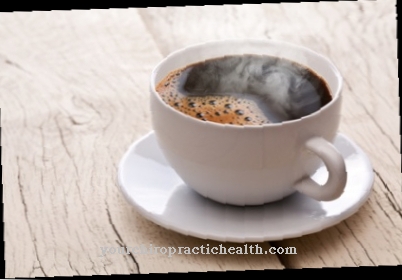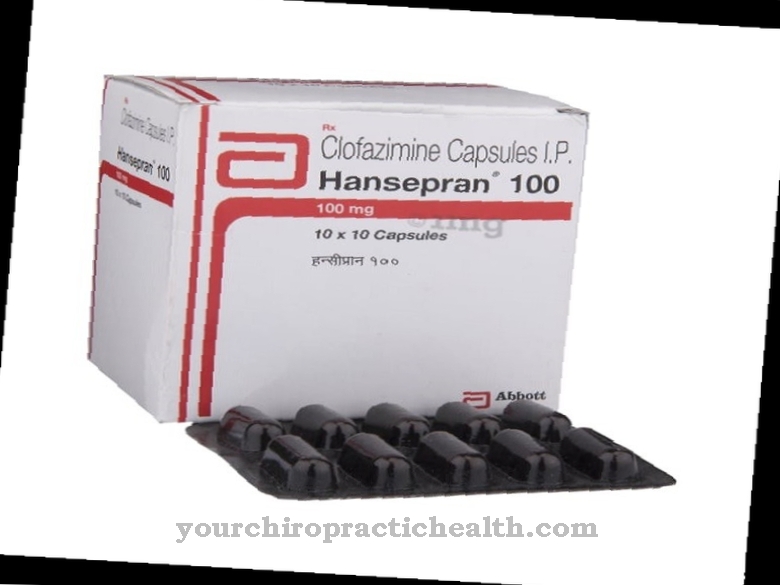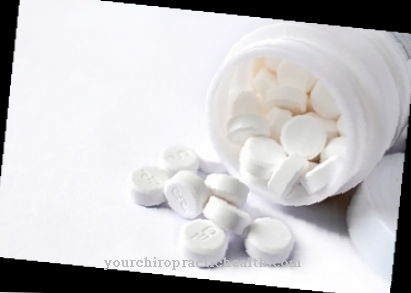The active substance Aprepitant is used to prevent and suppress nausea. This can be triggered in the patient after an operation or by chemotherapy. Almost without exception, the remedy is administered in conjunction with other medicinal substances.
What is aprepitant?

The aprepitant obtained from a chemical process is used orally. In this respect, it is regularly prescribed in the form of capsules and tablets. It should be used before the operation - surgery or cancer treatment. Only in this way can the feared nausea and the usually occurring nausea be suppressed or at least inhibited.
It is therefore a preventive agent. But not one that is used in the event of acute malaise. In doses of 40 to 125 milligrams, the aprepitant can be aimed at different types of nausea. The medication lasts an average of ten hours - a value that may vary in individual cases.
Pharmacological effect
With every intensive medical intervention, various biochemical processes take place in the organism of the person concerned. Some of them are triggered directly by the drugs being administered. Others follow indirectly from the metabolic functions that have already started. During an operation and when fighting tumors, messenger substances are regularly released. Among other things, the neurotransmitter substance P is affected. It is considered to be the cause of negative sensations such as pain, discomfort, nausea or vomiting. This messenger substance is usually carried from the nervous system into the brain.
However, the aprepitant attaches itself to the receptors in the brain stem. The substance P can no longer dock on them. The negative feelings and symptoms are suppressed in this way. It is advisable to use the product before the operation. This is the only way to ensure that all receptors are actually occupied. It can take about 30 to 60 minutes for the aprepitant to be fully occupied. In this respect, the medication is usually administered with other pain-relieving and calming agents before the medical intervention. It is rarely used on its own.
Medical application & use
The aprepitant is used in preparation for operations and chemotherapy. It is supposed to suppress the nausea that occurs in the aftermath as well as the expected nausea. The preparation is regularly combined with other active ingredients. In this way, the patient is calmed down, his pain perception is reduced, perception is slowed down, and physical discomfort is avoided.
Depending on the dosage of the individual ingredients, the drug should show its effects for about eight to ten hours after the procedure. However, it must always be analyzed on a case-by-case basis with a view to the state of health and any intolerances which remedies are used. The aprepitant could otherwise lead to the ineffectiveness of one or more of the existing preparations. The administration should therefore be carried out with great care.
The aprepitant must also not be used against acute complaints. In these cases, the receptors in the brain stem would already be occupied by substance P. The aprepitant could no longer have an effect here.
You can find your medication here
➔ Medicines against vomiting and nauseaRisks & side effects
However, the aprepitant is not only effective in preventing nausea and vomiting. It is reputed to cause a certain tiredness, headache, decreased cognition and loss of appetite. In addition, in a few cases an increased activity of the liver can be determined. This symptom can lead to serious health consequences if the organ is damaged. The general constitution of the patient must also be considered prior to administration.
Women who are pregnant or breastfeeding and people with a weakened body should rather take an alternative healing substance instead of the aprepitant. The interplay between the aprepitant and other prescribed drugs is also complex. In this case, it would have to be decided in advance with the attending physician which medication to avoid immediately before the procedure. Otherwise, both agents could mutually inhibit each other's effectiveness.
























.jpg)



